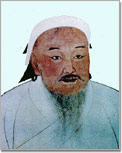
This site collects, sorts and annotates more than 275 resources about Genghis Khan, the great Mongol conqueror. It includes academic biographies to movies of his life, the hunt for his long-lost tomb and his surprising genetic legacy. It represents everything I can find of any value, but it can never be finished.

The elderly
Genghis Khan
What's here?
Start by reading one of the many Web Biographies. The Paper Biographies section reviews Weatherford's new account Genghis Khan and the Making of the Modern World, highly favorable to the Mongolian conqueror, and other major biographies. Examine selections from some of the major Primary Sources (too much hasn't made it on the web yet). Under Mongol Empire are found sections on the Mongol army, the Yasa or "Laws" of Genghis Khan, maps, timelines and so forth. The Kids section is devoted to the younger set, and to educators.
A number of topics have caused a stir. World's Greatest Lover? covers the findings that Genghis Khan is the direct ancestor of an astounding number of the world's population, and the private firm that offers Khan-targeted genetic testing. Tomb of Genghis Khan follows a recent ill-fated attempt to find Genghis' final resting place. Politics, Ethnicity and Ideology reviews the "use and abuse" of Genghis' image, from Chinese appropriation to Persian spleen. Travel enthusiasts will enjoy Travel and Travelogues, art aficionados the Art and Exhibitions section.
Lastly, explore the many terrible movies made of Genghis Khan's life, and the Literature, Art, Music he has inspired. Still not satisfied? There's always Miscellaneous, from business advice to pets.
| Add yourself to my Genghis Khan list, and get an update when features are added. If you like I can keep you up to date on my related sites, such as Alexander the Great on the Web. You'll never get more than one email per month, I promise! |
Who was Genghis Khan?
Genghis Khan was born Tem�jin between 1155 and 1167 (the date is uncertain) somewhere near Like Baikal in Mongolia. Although of noble blood, he inherited difficult circumstances in a fractious and violent Mongolia. Nevertheless, he was able to unite the Mongol tribes under his command, being proclaimed "Genghis Khan," or "Universal Ruler" in 1206. Striking out from the traditional Mongol homelands he defeated the Chinese states of Xia Xia and conquered much of the Jin Empire. He then went west, demolishing the Persian state of Khwarizm. His generals pushed Mongolian power to Novgorod in Russia. Genghis died in 1227, by one account owing to a fall from his horse.
Genghis Khan's rule has been variously assessed. Historians of the states he conquered, notably the Chinese and Persians who suffered greatly at the hands of Genghis and his descendants, stress his ruthless, indeed bloodthirsty tactics—massacring whole cities that resisted him. The Mongols have traditionally revered him as the father of their nation, who introduced a script for writing the Mongol language, and writing, and promulgated a harsh but fair code of law over his entire domain. Many scholars now emphasize his religious tolerance, tax policies, and the unparalleled "free-trade zone" his conquests created.
Help me Out
Did I miss something? Send me an email at [email protected]
Thank you for visiting!
Tim Spalding
Portland, Maine

All material © 2000–2005 Tim Spalding.
Presented in Association with Amazon.
If you enjoy this site you may also like these other sites by me:
Alexander the Great on the Web. Over 1,000 sites about Alexander the Great.
Ibn Battuta on the Web. Comprehensive guide to Ibn Battuta, the great 14th century Muslim traveler.
